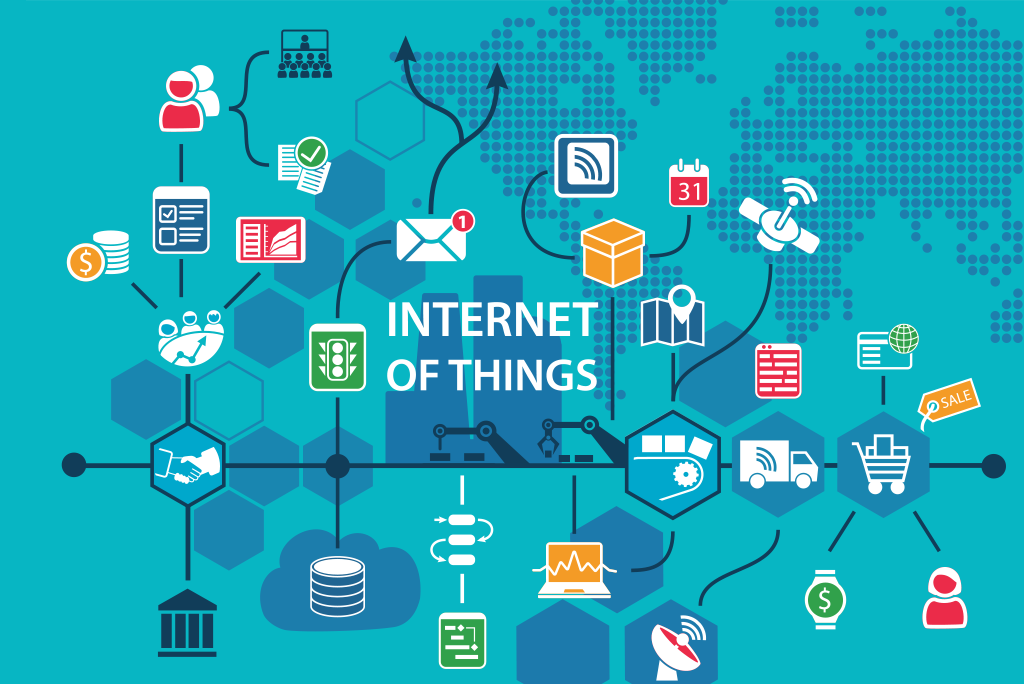
The Internet of Things (IoT) is gaining momentum. Between 2014 and 2019, the number of companies using IoT grew from 13% to 25%, according to the consulting firm McKinsey & Company. By 2023, there are expected to be 45 billion connected IoT devices, which will help set the foundation for future smart cities.
Despite the proliferation of connected devices, security concerns still pose a challenge to the full-scale development and integration of IoT. However, blockchain technology can help overcome this problem. Blockchain is a decentralized digital ledger of transactions that records data in a way that prevents hacking and altering of the data. It does this by duplicating transactions and dispersing them to “nodes” across the network.
IoT with blockchain technology can reshape our world in a number of major ways such as:
- Secure Smart Cities: Rather than keeping it centrally located, blockchain contains data within every node within the network. This means it would be extremely difficult—if not impossible—to hack smart city infrastructure.
- Secure, pay-as-you go transportation: The decentralized network created by blockchain could provide a secure pay-as-you-go IoT-based mobility service for car share customers, which can transform transportation.
- Improved manufacturing: Increasingly, manufacturing groups are using IoT sensors to monitor machines and real-time processes. This can allow manufacturers to identify problems before they happen. By integrating blockchain technology into their systems, manufacturers are working to improve security and to ensure data within the system is reliable.
- Transparent supply chains: In addition to the manufacturing sector, businesses in various industries use IoT sensors to track and trace products in real-time in order to verify the appropriate locations and conditions. Integrating blockchain with IoT allows data to be shared securely throughout all facets of the supply chain. This in turn allows for a faster, more efficient system. It can also help businesses improve the quality of their products and services, which in turn could boost customer loyalty.
- Consumer transparency: Currently, many consumers are in the dark when it comes to knowing where their data is kept, who can access it, or how it’s transferred. Blockchain would equip them with this knowledge, since it saves and logs all communications that happen within the user’s IoT devices.
- More efficient regulations: Blockchain would empower regulators with a more secure, transparent, uniform, and centralized way to maintain IoT data on people, organizations, assets, and activities.
- More affordable car insurance: Through wireless devices that can connect to vehicles’ diagnostic ports (which track per-mile usage), IoT can help decrease car insurance premiums that are currently based on average estimates. By integrating blockchain into this technology, financial data will be fixed and secure—and it can even be audited. Blockchain will also give regulators a more efficient way to track driver records, vehicle history, and tech checks. This can also help to prevent fraud.
IoT has the potential to transform industries as well as everyday life on an individual level. However, blockchain is crucial to securing and streamlining the IoT processes essential to build thriving smart cities of the future.
Blockchain in Your Industry
Stay up-to-date with the latest advancements in blockchain technology as it continues to grow. Interested in learning how blockchain could impact your industry? Check out Enterprise Blockchain for Healthcare, IoT, Energy, and Supply Chain, a five-course program from IEEE.
To get a license to this online program for your organization, contact an IEEE Content Specialist for more details.
Interested in the program for yourself? View the courses on the IEEE Learning Network, an IEEE learning management platform!
Resources
Koptelov, Andrey. (7 October 2020). Blockchain: The Underlying Architecture of Secure IoT Solutions. IoT for All.
Rensing, Lars. (25 September 2020). 4 ways blockchain is supporting the IoT. IoT Business News.


IoT technology also needs to prove that the infrastructure is secure, efficient and resilient. It still must overcome these constraints before new business solutions become staples in enterprise technology.